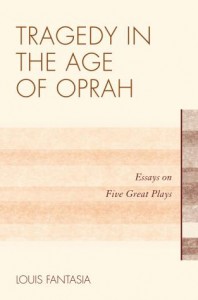The following is an excerpt from Louis Fantasia’s book: Tragedy in the Age of Oprah: Essays on Five Great Plays. This chapter examines Shakespeare’s tragedy King Lear in the age of reality television. This week, Bill spoke with actor John Lithgow about King Lear, the role he is playing right now in The Public Theater’s Free Shakespeare in the Park production.
The title of this post is a nod to Jan Kott’s seminal essay, “King Lear, or Endgame.” Published at the height of the Cold War in Shakespeare, Our Contemporary, Kott’s writing on Lear and other plays, particularly the comedies (Shakespeare’s Bitter Arcadia), influenced a generation of directors, notably Peter Brook, whose subsequent influence is still being felt on stages worldwide. Kott placed tragedy within the contexts of Absurdism and Existentialism, the prevailing theatrical and philosophical fashions of the time. The result was a reading of the plays in which every option open to the tragic hero was bad. Hamlet at mid-century was the anti-hero. He and the others in Shakespeare’s pantheon had “full freedom of decision and action. The gods do not interfere; they just watch and wait until he makes a mistake. Then they punish him.” [1] That mistake, of course, becomes the character’s fatal flaw.
The only logical, possible response was chance, to toss a coin as Rosencrantz and Guildenstern do at the beginning of Tom Stoppard’s play, and refuse to treat the tragic seriously. For Kott fate, gods and nature are replaced by history, which “is the only framework of reference, the final authority to accept or reject the validity of human actions. It is unavoidable… In this scheme of things, history is a theatre with actors, but without an audience. No one watches the performance, for everybody is taking part.”[2]
This Hegelian world-view, which seemed not only appropriate but remarkably perceptive in the years between the Cuban missile crisis and the first Prague uprising, can only be expressed by the grotesque. Shakespeare became a contemporary of Samuel Beckett and Bertolt Brecht. We were all part of life’s living theatre, engaged, political, ironic and absurd.
But what about today, what framework do we have for tragedy now? Social critics such as Francis Fukayama have declared history dead. Communism has been discredited for at least two decades, and Capitalism has lost its way, stumbling from an era of unbridled enthusiasm – as former Federal Reserve Bank Chairman Alan Greenspan once put it – to an era of prolonged economic depression. Religious fundamentalism is on the rise in all faiths, and technology, once the hope of the future, seems to have let us down. There is no “ism” left today as rich or as comforting in theory or practice as was available to Kott to guide us.
Instead, all I see is reality television.
Thou, Reality, Art My Goddess…
American Idol, Big Brother, The Apprentice, The Bachelor, The Biggest Loser, Project Runway, The Amazing Race, America’s Top Model, Top Chef, Top Gear, Keeping Up With the Kardashians, not to mention The Real Housewives of just about everywhere! These and dozens more such programs flood the airwaves with shameless behavior as one contestant after another tries to outwit, outplay and outlast his or her competitors.
“Outwit, Outplay, Outlast” is the mantra of the grand-daddy of all reality shows, Survivor, where sixteen rugged and telegenically fetching individuals are dropped onto exotic locations — Africa, the Australian outback, Tahiti, mysterious Oceanic islands or Central American jungles — and divided into teams. There, with nature as their backdrop, they are encouraged to lie, cheat, make alliances, scheme, betray, sell-out and sacrifice each other, all for the goal of being the ultimate survivor.
The show’s 11th edition, Survivor Palau, drew an audience of nearly 18 million viewers for its season debut in 2005. Eighteen million in one night! I’m not sure 18 million people have seen King Lear since the day Shakespeare wrote it. But think about it: the sisters, Goneril and Regan, would make excellent Survivor contestants, as would the brothers, Edgar and Edmund. Cornwall probably wouldn’t last very long, nor would Kent or the Fool. Albany would probably never condescend to watch the show, let alone appear on it. Lear and Cordelia? They would never even make it onto the program. No one would want them on their team, Tragic protagonists like Cordelia and Lear are always “the biggest losers.”
The perfect casting for Cordelia might be hapless Susan Boyle, the 47-year-old runner-up soprano on Britain’s Got Talent. Boyle, a modest Englishwoman who shocked the British TV show’s judges with her stunning voice, went on to spend a week or so in a British mental hospital recovering from the after-effects of instant celebrity. She had done the circuit of BBC talk shows, Larry King and, of course, Oprah, and it nearly did her in.[3]
Here’s a guide to survival techniques, gleaned from the Survivor manual given to potential contestants:
Size up the situation.
Undue haste makes waste.
Remember where you are.
Vanquish fear and panic.
Improvise.
Value living.
Act like the natives.
Learn the basic skill.[4]
The perfect Survivor contestant is the Machiavellian Prince, whose ends justify the means. The reality for most of our planet’s inhabitants is that this Hobbesian view of the world is right. The life of man is nasty, brutish and short. Forty-five thousand people die in an earthquake in Pakistan. Fifty thousand Americans are permanently displaced from their homes by Hurricane Katrina. Dozens die each week from suicide bombings in Iraq or starvation in Darfur, and the list goes on. Meanwhile millions of Americans watch the most ludicrous sorts of behavior rewarded with million dollar checks and lucrative, if brief, post-show contracts in the entertainment industry. Worse, people now crash White House receptions and stage all sorts of stunts to get themselves on these programs. And we wonder why, when it comes to debates about issues such as health care, economics and foreign policy, our public discourse is so shrill and shallow?
I am not the Grinch. Let’s face it, these shows can be a lot of fun to watch. In the interests of full disclosure, I confess a certain addiction for the scantily-clad cattiness of America’s Top Model; a grudging affinity for the bullying, obscenity-filled criticism of chef Gordon Ramsay; and a secret desire to have host Jeremy Clarkson’s job driving fast cars on Top Gear. But, in the Age of Oprah “reality” has become the opiate of the people. No wonder the national response to Katrina was so embarrassingly slow, the storm didn’t look that bad at first on TV.
One of the major textual issues in King Lear is who gets the last word, literally. Which of the survivors says the final lines of the play? Is it the Duke of Albany, a modest man, married to one of the evil daughters, who steps out of his study when duty to his nation calls? Or is it Edgar, Gloucester’s legitimate son, who has disguised himself for much of the play?
Edgar has done everything in the Survivor manual and more to survive. He sized up, watched, kept cognizant of where he was, overcame his fear and panic, improvised constantly, certainly acted like a native, and learned the basic skill of ruthlessness in the jungle. But is that who I want standing, coronet in hand or on head, on the King’s square of the chessboard as the curtain comes down? A “survivor?” I don’t think so. Not today.
I would give the last lines of the play to Albany, not because of some 17th Century patrilineal world picture (he is Lear’s son-in-law after all), but because Albany doesn’t want the job. Look at the people who want to be on reality television, or worse, who want to be in politics, people like former South Carolina Governor Mark Sanford, or Presidential candidates John Edwards or Herman Cain, or disgraced New York Governor Eliot Spitzer, among others. The shallowness and hypocrisy of it all are almost too much to bear.
No, I vote for Albany, a milk-livered moral fool, who has no desire to air his dirty laundry in public. “Some are born great, some achieve greatness, and some have greatness thrust upon them,” writes Shakespeare in another play with a Fool. We need to hear the Fools today and not the apparently sensible, well-groomed and packaged types we generally get for daily consumption in entertainment and politics. Edgar may have ultimately become (Harley) Granville-Barker’s “Christian gentleman.” He may have even learned to speak what he feels, and may, after his torturous journey of self-discovery, even be the best man for the job. But I still vote for Albany.
I see Albany stepping out from the trio of survivors around the inverted Pieta of dead Cordelia in her father’s arms, putting the battered coronet on his head, taking on a responsibility he somehow knew was always there waiting for him, outside his study.
ALBANY: The weight of this sad time, we must obey
Speak what we feel, not what we ought to say
The oldest hath borne most.
We that are young
Shall never see so much, nor live so long.
The “we’s” resonate. They are not royal, they are us. We know the weight of this sad time, just turn on the television. We look for someone who also has suffered, perhaps also loved, to lead us through it. Someone human.
Something Koznitsev wrote while working on Lear echoes within me:
“Working on Shakespearean tragedy reminds one of archeology; the search is always going deeper, beneath the limits of the top layers; the whole is usually reconstructed from fragments. But the strange thing is that the deeper you dig, the more contemporary everything that comes to the surface seems as it reveals its significance. The fragment relates to the past but it is as if the plate was broken today; it is possible that just such a plate will be broken tomorrow…”[5]
That’s the connection we really need to make today. The fragments of the past that we see on stage reveal the significance of our lives today more than all the talk shows and reality programming of our popular culture. We are in danger of drowning the significant in the sea of the trivial.
“Fail harder,” Beckett once said. “Fail better.” We must keep digging into these plays as if our survival depended on it.
Because it does.
Footnotes:
1 Kott, Contemporary, p. 107
2 Kott, Contemporary, 109-110
3 Boyle’s fairy tale did have a happy ending, though. Her debut album, I Dreamed a Dream, was the UK’s best-selling album of all time.
4 Mark Burnett & Martin Dugard, Survivor: The Ultimate Game, (New York: TV Books, 2000)
5 Kosnitsev, p 82
Excerpted from Tragedy in the Age of Oprah: Essays on Five Great Plays. Copyright © 2012 by Louis Fantasia. Excerpted by permission of Rowman & Littlefield. All rights reserved. No part of this excerpt may be reproduced or reprinted without permission in writing from the publisher.
The views expressed in this post are the authors’ alone, and presented here to offer a variety of perspectives to our readers.



